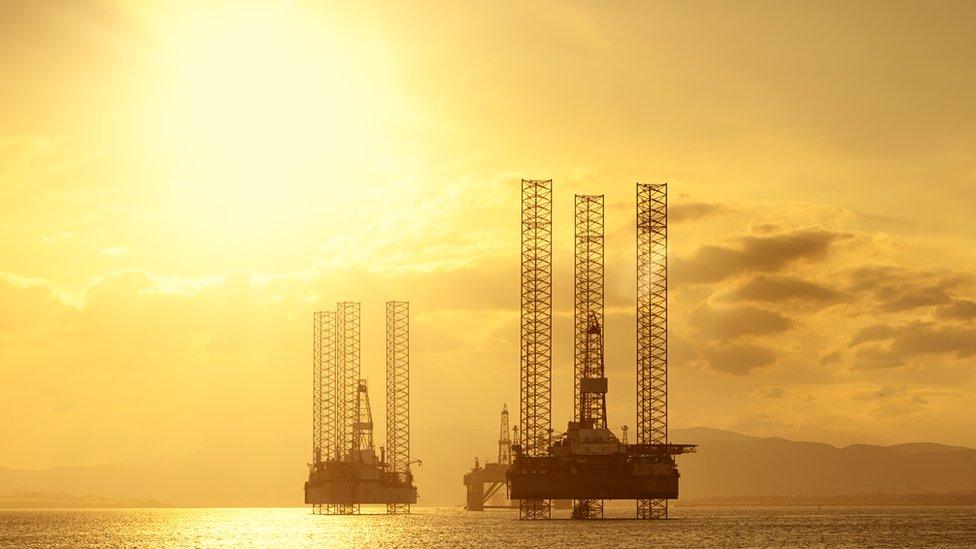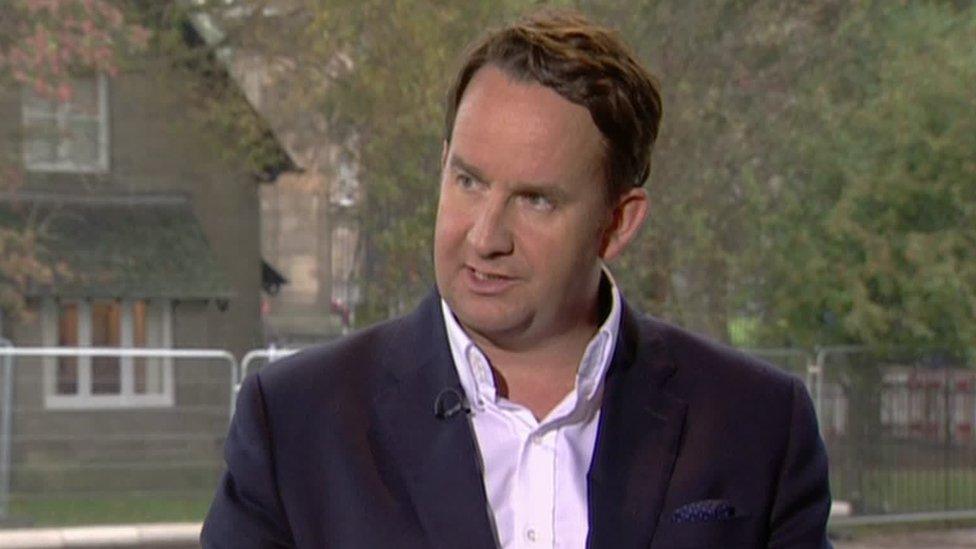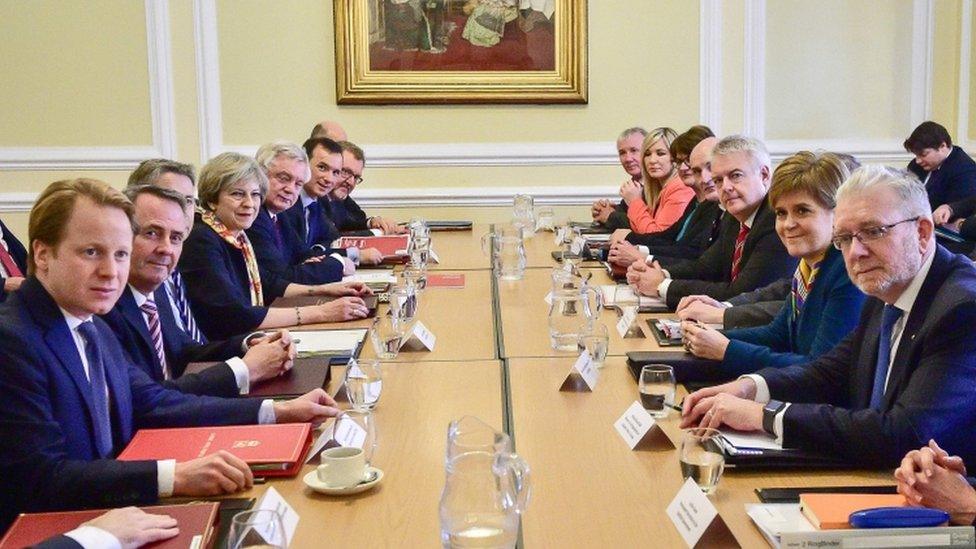Scottish independence: SNP's economic case 'should not include oil'
- Published

The economic case for independence should not include North Sea oil revenues, the chairman of the SNP's growth commission, external has said.
The commission, headed by former MSP Andrew Wilson, was set up by the SNP to help shape its future economic policy.
Mr Wilson suggested that making North Sea revenues central to the economic arguments for independence ahead of the 2014 referendum had been a mistake.
He said any future campaign would need to balance optimism and realism.
Concerns about the potential economic impact coupled with the UK government ruling out the possibility of a currency union are widely seen as being central reasons for Scottish voters rejecting independence by 55% to 45% in 2014.
'Zero revenues'
The Scottish government's White Paper on independence, external ahead of the referendum had predicted North Sea oil revenues of between £6.8bn and £7.9bn in 2016/17 - which would have been the first year of independence if Yes had won.
It also said independence would ensure that "taxation revenues from oil and gas support Scottish public services, and that Scotland sets up an Energy Fund to ensure that future generations also benefit from our oil and gas reserves".
Since then, the North Sea oil price has plummeted - with UK oil and gas production generating negative receipts in 2015/16 of -£24m, compared with +£2.15bn the year before.

Mr Wilson was named as the chairman of the commission by First Minister Nicola Sturgeon
Mr Wilson, whose report is due to be delivered to the first minister in the coming weeks, said Yes campaigners had argued ahead of the 2014 referendum that "oil was a bonus and not the basis" of the economic case for independence.
He told the BBC's Scotland editor, Sarah Smith: "But we did have oil baked into the numbers and it was indeed a basis.
"So I can say with some certainty in terms of our own work that we'll assume for the purposes of our projections that oil is producing zero revenues and therefore treat any revenues that we get from oil as a proper windfall to be used on intergenerational projects rather than spent on spending today."
The Scottish government's Government Expenditure and Revenue Scotland (Gers) figures, which were published last August, put the country's spending deficit at just under £15bn in the previous financial year, partly because of the fall in oil revenues.
That figure represented a 9.5% share of Scotland's GDP - more than double the 4% figure for the UK as a whole.

Analysis by Sarah Smith, Scotland editor
The SNP are already preparing for the possibility of another referendum.
They have experts working hard on formulating a new economic case for independence, considering key questions such as what currency an independent Scotland might use and how they would cope with the sharp fall in the price of oil.
Other Yes supporting campaign groups have already started fundraising.
But calling another referendum would still be a gamble, and the consequences of defeat could be disastrous for Nicola Sturgeon.
To lose two referendums in quick succession could set back the cause of Scottish independence for at least a generation.
And there could be a high personal cost. Both Alex Salmond and David Cameron resigned immediately after losing referendums. There would be an expectation that Nicola Sturgeon would have to do the same.
But still, every time the first minster mentions the possibility of another vote she makes it seem increasingly likely.
Sarah will be examining the SNP's possible strategy for a second referendum on BBC Radio 4's Analysis programme at 20:30 on Monday 6 March.

Mr Wilson said it was "true that the economic circumstances are fraught at present", and that the "world sea is very stormy".
He added: "The energy sector has had troubles and the fiscal inheritance that we would have from the rest of the UK is a very difficult one.
"All of the above, however, would be a reason to change the way you're operating rather than to stay stuck to your deckchair on the Titanic.
"There are plenty of precedents that we're looking to from around the world of small countries who have put governance in place and put programmes in place that can both ensure that their economy grows and the welfare of people increase.
"But the financial footing that they're on is one that the markets and people who would be funding the government can respect, and that's what we would seek to achieve."

The UK and Scottish governments remain at loggerheads over Brexit
He said he did not think a future independence campaign would explicitly be arguing that there would be "short-term pain but long-term gain" following a Yes vote.
But he added: "I do think there will be a very purposeful approach to all of us working very hard to make it successful.
"I guess that's why oil's not a particularly helpful argument - because it gives the suggestion that somehow there's a free lunch and that we won't have to work, and of course we all will have to work no matter what happens.
"Independence would give us more tools and that's what's different".
Mr Wilson also said it was "imperative" for Scotland to continue to have full access to both the UK and EU single markets, and to be able to grow its population.
First Minister Nicola Sturgeon has said that a second independence referendum is "all but inevitable" following the Brexit vote - but has insisted that the UK government can avoid one by agreeing to its demands to allow Scotland to retain its membership of the EU single market.
However, opponents have accused her of using Brexit as an excuse to push for independence - and argue that the UK market is worth four times more to Scotland's economy than the EU is.
'Constitutional grievance'
In her address to the Scottish Conservative conference on Friday, Prime Minister Theresa May said the SNP was "interested only in stoking-up endless constitutional grievance and furthering their obsession with independence, at the expense of Scottish public services like the NHS and education".
Scottish Conservative finance spokesman Murdo Fraser said Alex Salmond had "never admitted he tried to mislead people on oil during the 2014 referendum. Now that even his own SNP colleagues are owning up, it is time he did so himself."
He added: "If the SNP is now admitting oil is a bonus, it must set out which taxes would rise and what public services would be cut in order to fill an independent Scotland's £15bn deficit."
Scottish Labour's Jackie Baillie said her party had "warned time and again during the 2014 referendum about the SNP's rose-tinted fantasy of an independent Scotland's finances" but had been accused of "talking Scotland down".
She added: "Now the SNP's own economics guru has admitted promises of a land of milk and honey were a figment of Alex Salmond's imagination.
"And that reality has hardly changed. With a £15bn deficit, the cost of independence to our valued public services would be even more brutal".
Scottish Liberal Democrat leader Willie Rennie said the economic case for independence was "weaker than ever" with the plummeting oil revenues, adding: "The SNP will need to explain which public services will be cut to pay for independence."